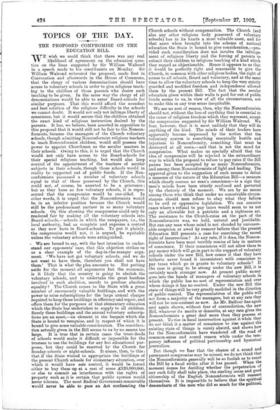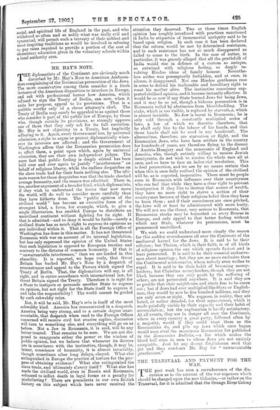TOPICS OF THE DAY.
lab PROPOSED COMPROMISE ON THE EDUCATION BILL.
WE wish we could think that there was any real likelihood of agreement on the education ques- tion on the lines suggested by Sir William Walrond in a speech made to his constituents on Monday. Sir William Walrond reiterated the proposal, made first in Convocation and afterwards in the House of Commons, that the clergy of various denominations should have access to voluntary schools in order to give religious teach- ing to the children of those parents who desire such teaching to be given. In the same way the clergy of all denominations would be able to enter Board-schools for similar purposes. That this would afford the soundest and best solution of the religious difficulty in the schools we cannot doubt. It would not only not infringe liberty of conscience, but it would secure that the children obtained the exact kind of religious instruction desired by the parents. It has, we believe, been asserted in opposition to this proposal that it would still not be fair to the Noncon- formists, because the managers of the Church voluntary schools, though admitting Nonconformist religious teachers to teach Nonconformist children, would still possess the power to appoint Churchmen as the secular masters in their schools. Owing to this, it is urged that the Church would not only have access to the Board-schools for their special religious teaching, but would also keep control of the appointment of the teachers of secular subjects in their schools, though those schools would in reality be supported out of public funds. If the Non- conformists possessed a number of voluntary schools equal to that of those possessed by the Church, this could not, of course, be asserted to be a grievance ; but as they have so few voluntary schools, it is repre- sented that the compromise would be one-sided. In other words, it is urged that the Nonconformists would be in an inferior position because the Church would still be the predominant partner in so many voluntary schools. On this showing the compromise could only be rendered fair by making all the voluntary schools into Board-schools,—schools in which the ratepayers, i.e., the local authority, had as complete and supreme a control as they now have in Board-schools. To put it plainly, the compromise would not, it is argued, be equitable unless the voluntary schools were extinguished.
• We are bound to say, with the best intention to under- stand our opponents' case, that this objection strikes us as a clear example of the dog-in-the-manger argu- ment. ' We have not got voluntary schools, and we do not want to have them, therefore you shall not have them.' That is what the plea amounts to. But putting aside for the moment all arguments but the economic, is it likely that the country is going to abolish the voluntary schools, and to undertake the great burdens involved in such abolition, merely to produce absolute equality ? The Church comes to the State with a great number of enormously valuable buildings, and with the power to raise subscriptions for the large annual charges required to keep those buildings in efficiency and repair, and offers them for the purposes of that elementary education which the State has undertaken to supply to all children. Surely these buildings and the annual voluntary subscrip- tions are an asset,—an element in the bargain which the State is bound to recognise, and in respect of which it is bound to give some valuable consideration. The considera- tion actually given in the Bill seems to us by no means too large. It is true that in certain cases the trust-deeds of schools would make it difficult or impossible for the trustees to use the buildings for any but educational pur- poses, but they could be reserved by the Church for Sunday-schools or night-schools. It comes, then, to this : that if the State wished to appropriate the buildings of the present Church schools for elementary education, over which it would have sole control, it would be forced either to buy them up at a cost of some £120,000,000. or else to commit an interference with the rights of property such as it is certain that public opinion would never tolerate. The most Radical Government conceivable would never be able to pass an Act confiscating the Church schools without compensation. The Church (and also any other religious body possessed of voluntary schools) has in its hands a most valuable asset, and for that asset when brought into the scheme of national education the State is bound to give consideration,—pro- vided such consideration does not involve the infringe. ment of religious liberty and the forcing of parents to submit their children to religious teaching of a kind which they regard as objectionable. Hence it appears to us that it would be perfectly right and reasonable to give the Church, in common with other religious bodies, the right of access to all schools, Board and voluntary, and at the same time to allow the voluntary schools to keep the very strictly guarded and modified freedom and independence allowed them by the present Bill. The fact that the secular education given within their walls is paid for out of public funds seems to us, in view of all the circumstances, not to make this in any true sense inequitable.
We see no sort of reason, then, why the Nonconformists should not, without the loss of anything that is essential to the cause of religious freedom which they represent, accept the compromise suggested by Sir William Walrond. We fear, however, that it is most unlikely that they will do anything of the kind. The minds of their leaders have apparently become impressed by the notion that the voluntary system is something essentially hostile and injurious to Nonconformity, something that must be destroyed at all costs,—and that is not the mood for compromise. What makes us specially afraid that the idea of compromise will be rejected is the extraordinary way in which the proposal to refuse to pay rates if the Bill passes has been accepted by so many Nonconformists, and among them Nonconformists of light and leading. The approval given to the suggestion of such means to defeat a measure of the nature of the Education Bill—a measure which clearly coerces no man's conscience—is a sign that men's minds have been utterly confused and perverted by the rhetoric of the moment. We are by no means among those who think that under no conceivable circum- stances should men refuse to obey what they believe to be evil or oppressive legislation. We can conceive cases where a refusal to pay taxes would seem to us not only an allowable but a patriotic and a righteous act. The resistance to the Church-rates on the part of the Nonconformists was, we hold, natural and justifiable. But can any man whose mind is not clouded by unreason- able suspicion or awed by rumour believe that the present Education Bill presents a case for exercising the sacred right of insurrection ? At any rate, if it does, the Noncon- formists have been most terribly remiss of late in matters of conscience. If their consciences will not allow them to pay money which will go in part to the support of voluntary schools under the new Bill, how comes it that they have hitherto never found it inconsistent with conscience to pay taxes which go in grants to voluntary schools ?. If the case is going to be strong under the new Bill, is certainly much stronger now. At present public money goes into the hands of managers of voluntary schools in which the public has no sort of representation and over whose doings it has no control. Under the new Bill this state of things will be very greatly modified in the direction of public control. The representatives of the public will not form a majority of the managers, but at any rate they will not be non-existent as now. As Mr. Balfour has again and again shown, without fear of contradiction, the new Bill, whatever its merits or demerits, at any rate gives the Nonconformists a great deal more than they possess at present. To rise in fiscal insurrection against it while they do not think it a matter of conscience to rise against the existing state of things is surely absurd, and shows how far the Nonconformists have wandered off the road of common-sense and sound reason while under the tem- porary influence of political partisanship and hysterical journalism. But though we fear that the chance of a sound and permanent compromise may be missed, we do not think that the Nonconformists generally will be so foolish as to resist the Bill by a fiscal strike after it has passed. When the moment comes for deciding whether the perpetration of any such folly shall take place, the sterling sense and good citizenship of the English Nonconformists will reassert themselves. It is impossible to believe that the spin. tual descendants of the men who did so much for the political. social, and spiritual life of England in the past, and who withstood so often and so nobly what was really evil and tyrannical, will permit such a travesty of their noblest and most inspiring traditions as would be involved in refusing to pay rates required to provide a portion of the cost of elementary education given in the voluntary schools within a local authority area.











































 Previous page
Previous page